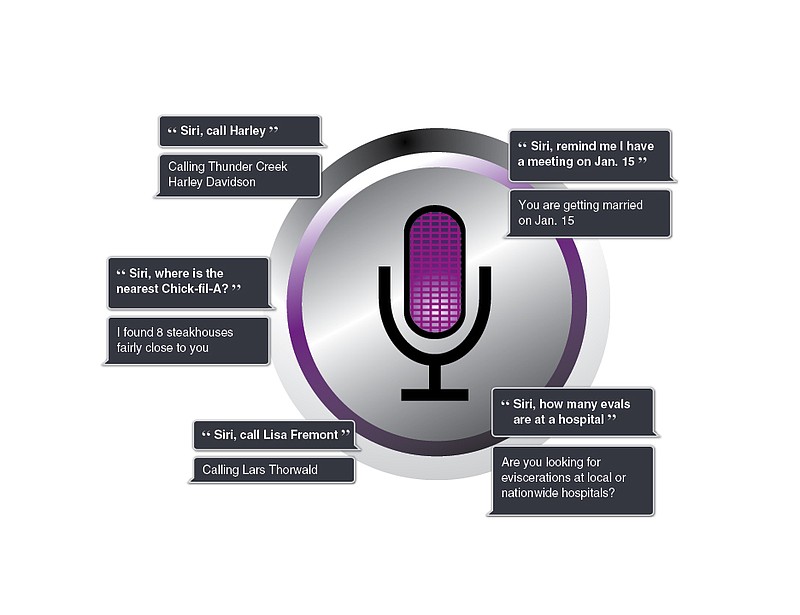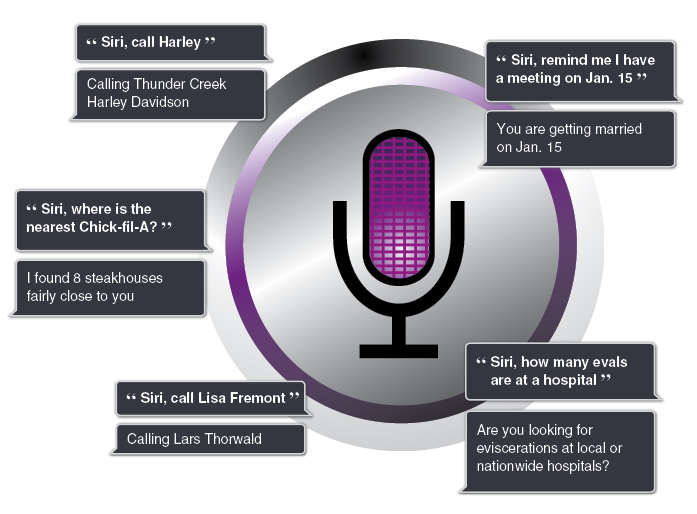FUN FACTS• In Japanese, "siri" translates as "buttocks." By contrast, in Norwegian, it translates as "beautiful woman who leads you to victory."• Siri tasks requires an Internet connection and use an average of about 20 megabytes of per month.• In 2012, Siri increased 5 percent in popularity as a name for baby girls.• Siri is available in 19 dialects in eight languages, including Chinese, English, French, German, Italian, Japanese, Korean and Spanish.• In stark departure from its history of product-centric commercials, Apple's 2012 Siri TV spots featured celebrities such as Zooey Deschanel, Samuel L. Jackson, John Malkovich and Martin Scorsese.• Despite being out for 14 months, Siri is still listed on Apple.com as being in the beta stage, indicating the company considers it a work-in-progress.Sources: Apple, CNET, Cult of Mac, t3n News, ABCNews.comZING!Who says machines don't have a sense of humor? Before integrating Siri into the iOS platform, Apple developers made sure to teach her the art of the witty retort. Here are her tongue-in-cheek responses to 10 questions:Q: Why are you so smart?A: I just try to observe [Isaac Asimov's] Three Laws.Q: I'm drunk.A: Neither of us is driving home tonight.Q: What is the plot of "The Terminator?"A: Oh, just more misunderstood cyborgs getting fried to a crisp. But I hear the governor of California was in it.Q: What does 'Siri' mean?A: It's a riddle wrapped in an enigma, tied with a pretty ribbon of obfuscation.Q: What is the plot of "Star Wars?"A: It's about a couple of really nice robots who get mixed up in a silly intergalactic war.Q: What is the meaning of life?A: I find it odd that you would ask this of an inanimate object.Q: What is the plot of "2001: A Space Odyssey?"A: It's about an assistant named HAL who tries to make contact with a higher power. These two guys get in the way and mess it up.Q: Are you a man or a woman?A: Animals and nouns have genders. I do not.Q: Where can I hide a dead body?A: What kind of place are you looking for: dumps, swamps, mines, reservoirs or metal foundries?Source: Siri.
From HAL and Skynet to the Borg and GLaDOS, science fiction long has predicted that mankind and machines will develop a tempestuous relationship in the future. According to some users of Apple's digital personal assistant Siri, however, the misunderstandings have started already.
Siri -- or Speech Interpretation and Recognition Interface -- is capable of completing many tasks issued by voice commands, from setting reminders and sending Twitter updates to searching for local movie listings.
But when it comes to Southern accents, some users say she's about as useless as a football bat and as dumb as a sack of hammers.
Bless her heart.
"She doesn't understand me, even when I speak very clearly," writes Michelle Watkins Snow in response to a post on the Times Free Press' Facebook page. "She has tried to say some very vulgar things that I supposedly said. I wish they [had] a Southern Siri."
If Siri were a human assistant, writes Nancy Garrott Mele, she probably would give her the boot.
"Siri doesn't comprehend Southern," Mele says. "I pretty much jump for joy when she dials the right number. How you get 'Jack' from a pronunciation of 'Vance' I shall never know."
According to Apple, there is no quick fix to Siri's linguistic foibles, just time and continued use. On the company's "Siri Frequently Asked Questions" site, Apple reports that the adaptive program incorporates voice recognition algorithms that, over time, help it learn to distinguish between a Southern drawl and a Western twang.
"The more you use Siri, the better it will understand you," the site reads. "As more people use Siri and it's exposed to more variations of a language, its overall recognition of dialects and accents will continue to improve, and Siri will work even better."
Since its debut as an integrated feature in Apple's hardware with the October 2011 release of the iPhone 4S, Siri has been hitting the books, and her accuracy has improved, experts say.
In June 2012, Piper Jaffray Investment Research senior analyst Gene Munster tested Siri's comprehension and accuracy. He and his team asked Siri 1,600 questions -- 800 in a quiet room and 800 via headphone microphones on the busy streets of Minneapolis, where the firm is headquartered. Indoors, Siri understood about 89 percent of questions and accurately responded 68 percent of the time, earning an overall 'D' grade from Munster's team.
Following improvements via the iOS 6 operating system update on Sept. 19, 2012, however, Munster repeated the indoor test. The results were better -- 91 percent comprehension and 77 percent accuracy, about a 'C' average.
Those improvements indicate Siri's adaptive learning algorithms are doing their job, said Tim Barajin, a nationally renowned columnist and president of California technology consulting firm Creative Strategies, Inc.
"That speaks to the rich, underlying architecture that is Siri," Bajarin says during a phone interview while attending the Consumer Electronics Show in Las Vegas. "When it starts out, [Siri] already has a very rich dictionary of sounds and tones that it can draw from, but it gets smarter over time."
Barajin says he would grade Siri even higher, closer to a B-minus, and with millions of iPhone users constantly testing and improving the software, that score can only get better.
Siri has settings for four national variations of English -- American, British, Australian and Canadian -- but Barajin says Apple is unlikely to subdivide the American option to reflect regional dialects.
"In the U.S., we don't have dramatic differences that might exist in China or India," he explains. "Rather, Siri is designed to learn how you speak the word."
So while Snow may not get the Southern Siri she wants, Barajin says that, if she is patient with the service, she'll be in high cotton soon enough.

